We’re Discarding the Wisdom of Our Sages
Humility, the praise-worthy attribute of Moses. is sorely lacking from our president.
Once in a while, instead of going to the synagogue with my father and mother, who attended the Beth Hamidrash Hagadol (the Great House of Study), where for an annual fee my father had the privilege of having a “balabatish” seat on the Eastern Wall, I joined my grandfather at the Chevrey Tanach (Friends of the Tanach), a relatively small and heimish synagogue his friends attended.
The Chevrey Tanach occupied an unassuming building at the back of the fishmonger’s courtyard. While my grandfather’s seat was not at the Eastern Wall, it was right behind the ark and behind one of his friends, a storekeeper with a pleasant voice who had the honor of being the sheliach tzibur, the cantor.
He was not only the cantor, but also the collective’s messenger to G-d. His seat was also just a few rows in front of the bimah.
Get The AJT Newsletter by email and never miss our top stories Free Sign Up
On the way home after one summer Shabbat service, my grandfather stopped and pointed to a person who was also walking home from services. “Tuli,” he said, calling me by my nickname, all while pointing to a person, “there goes a great man. He is a real eidler man.”
The term “eidler man” was an earned honor and referred to a caring and, above all else, humble person. In this sense, my grandfather Leyzer Yaakov gave honor to that person, for among many other attributes, first and foremost is to be a man of humility.
The Torah, for instance, honors Moses not necessarily because he was the lawgiver and spoke directly with G-d, but because he was the humblest person — humbler, the Torah declares, than any other person who departed from Egypt.
He didn’t make himself king, nor did he ensure that his sons would have high status. In fact, we know nothing about them. Moses (in the name of G-d) gave the hereditary position of high priest to his brother, Aaron.
Moses followed the wisdom later stated by the sages: “He who seeks and runs after honor, the honor escapes him.”
Humility, from the Jewish perspective, is a must for our leaders. We believe that a great person starts with humility and adds wisdom. Our leaders should be like a metal can that is filled with gold pieces, so that when it is shaken, it is still quiet.
Moses is our example par excellence of a leader who is not bombastic and loudmouthed, but, as his father-in-law, Jethro, observed, who toils without the consideration of honor because he is a caring person seeking that which is good for its own sake.
It is tragic that we in the United States, Jews and non-Jews alike, support those in power who manifest the opposite to the values our sages sought in a leader. It seems we equate loudness with power and honor people who lack the virtues of wisdom and humility.
In the Jewish aggadot (tales), our sages compare the two most significant rivers in the Middle East, the Tigris and the Euphrates. Our sages confront the Tigris, asking: “Why are you such a loud and angry river, known even to throw up boulders, while your brother the Euphrates is quiet and pleasant?”
The Tigris answers: “My brother the Euphrates can afford to be quiet; he does not need not make himself visible and loud. He achieved fame by annually flooding the plains around him and making them the most fertile of all lands. But if I do not shout, who will take notice of me?”
Is this President Donald Trump’s fear, that his lack of wisdom will make him unnoticeable?
Using the analogy of our sages, our leader is fearful of not being noticed and honored, and becomes like a can with one piece of silver in it, which is very loud when shaken.
I find him similar to the straw man in “The Wizard of Oz,” who sought reaffirmation of his wisdom and knowledge by the symbolic representation of a diploma, which in our case is the president’s demand for the Nobel Peace Prize — a prize that is granted and not lightly given to those who make this world better.
Granted, the Nobel panel sometimes makes mistakes, but I have never heard of the prize being given just because someone in power demands it. I can only repeat Cicero’s comment: “O tempora, o mores” (roughly, “oh, what times”).
The honest and humble person, our sages tell us, performs deeds leshem shemah, for intrinsic reasons, for the sake of humanity and not for honor. But this is not what we see today.
Our president acts for extrinsic reasons. He seeks actions calculated to gain honor and finds to his dismay, as our sages proposed, that “he who seeks honor for egoistic reasons, the honor runs away from him.”
It is a shame that this president is preoccupied with being a leader of power rather than a leader of morals, a jealous person who cannot bear the success of his predecessors.
As a Jew, I find that we are confronted with a twofold tragedy. First, that we as a nation do not seek men of honor, humility and vision for a peaceful future. Second and perhaps more tragically, that we Jews have discarded the wisdom of our sages, separating ourselves from our history and compounding the loss of our identity and our ongoing assimilation.





comments